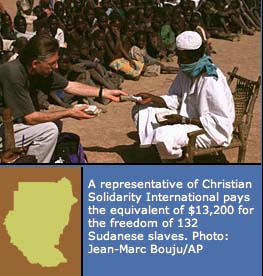Thousands of women and children abducted during 20-year civil war.
Type: Source and Destination Country
Background
Slavery has a long history in Sudan, Africa’s largest country. For centuries, Arabs from what is now the north of Sudan routinely raided African villages to the south. In 1983, those raids resumed when the Muslim, Arab-dominated government in Khartoum attempted to impose Sharia law on the largely Christian and animist south. As fighting broke out between north and south, women and children became the spoils of war for both sides, setting off a much-publicized human rights crisis. Some captives are sold as slaves, while others are forced into military service or to work as field laborers. Estimates on the number of victims range from 5,000 (a government number) to 100,000 (an NGO number). Ceasefire talks in September 2003 offered some hope for an end to Sudan’s slave trade, but other traffickers are at work here, too. Among them is the Ugandan rebel group Lord’s Resistance Army, which uses Sudan as a market for its own supply of abducted children.
Victims
Though frequent reports by former slaves indicate that raiders routinely shoot male villagers, others indicate that men are instead often used as soldiers or laborers by government or rebel forces. Women and children are the most frequent victims, used for domestic labor, sex, or as soldiers. Ages range from toddlers to women in their mid-30s. Most are subjected to some form of physical or sexual abuse. In Khartoum, children are often presented to government officials as gifts, THE CHRISTIAN SCIENCE MONITOR reported in 2000. Even al Qaeda is allegedly involved in Sudan’s trade in humans. A 1998 U.S. State Department human rights study reported that intercepted radio communications indicated that Osama bin Laden offered one Kalashnikov gun for each child brought to work on his marijuana farms in Sudan.
Counter-Trafficking Efforts
Officially, Khartoum does not recognize that slavery exists in Sudan. Local militia do the fighting for government troops and take their loot in the field — a situation that allows the government to claim ignorance of human trafficking by its armed forces. In 1999, though, international outcry at Sudan’s slave trade prompted Khartoum to form the Committee for the Eradication of the Abduction of Women and Children (CEAWC). Overseen by Save the Children and the UNICEF, CEAWC claims that no abduction cases have been reported since its creation. At the same time, though, no prosecutions of alleged slave traders or abductors are known to have occurred, either.
One controversial approach to stopping Sudan’s trafficking has been advanced by the relief group Christian Solidarity International, which buys slaves’ freedom for between roughly $35 to $50 per slave. The group says it freed roughly 38,000 slaves between 1995 and 2000. UNICEF and other international organizations have condemned the practice, saying that it only fuels the demand for slaves.



